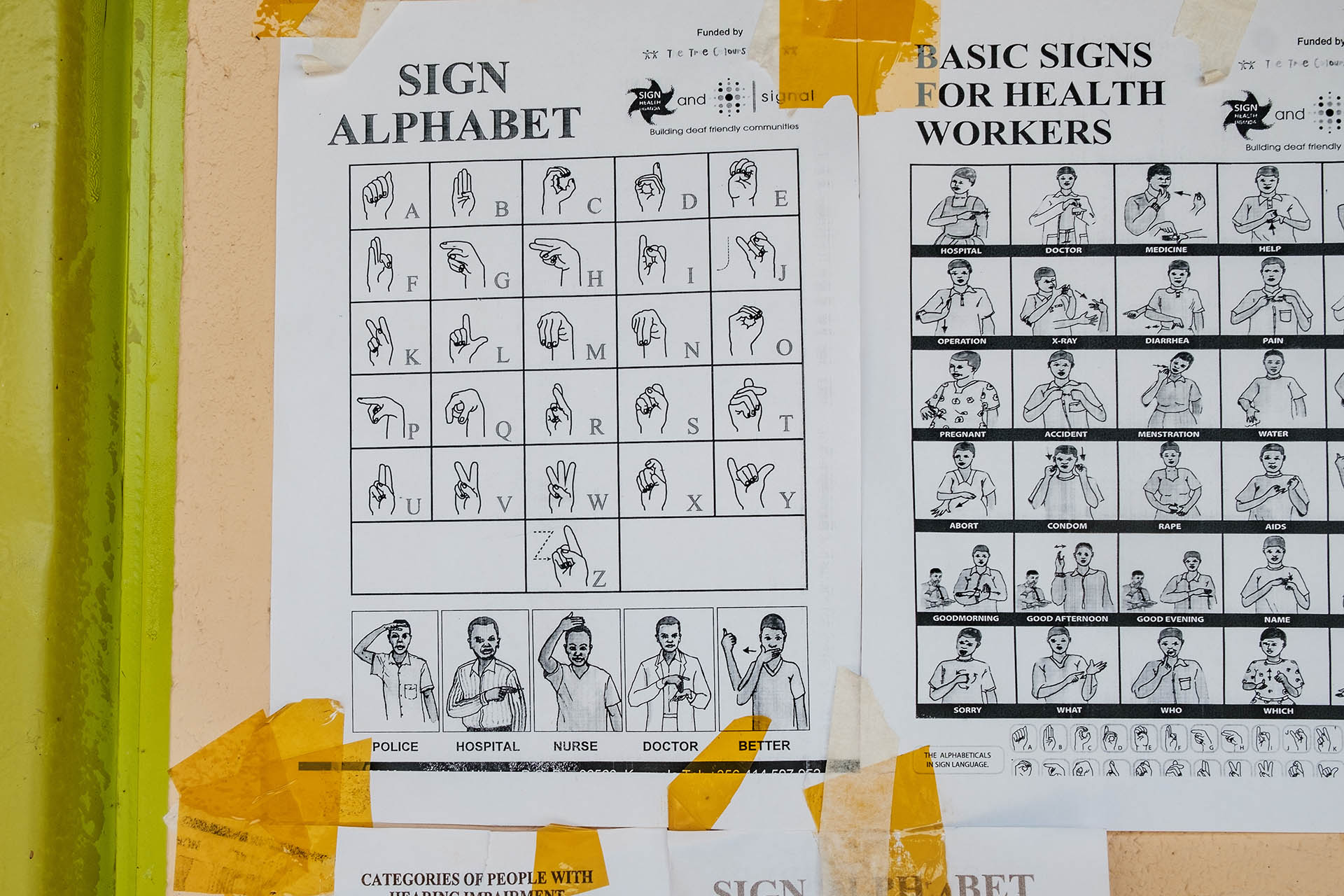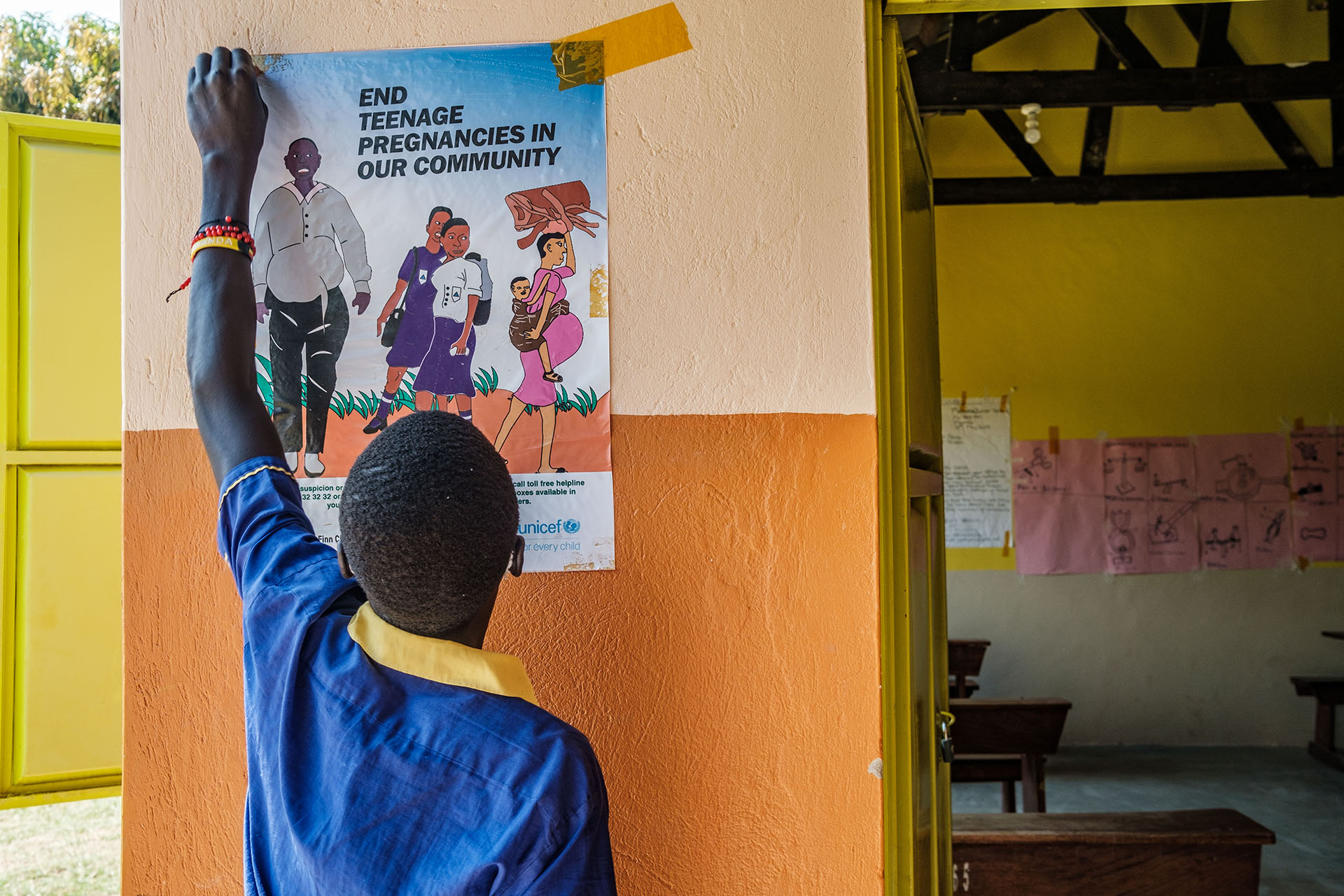Inclusive education provides a safe and conducive environment for learners with disabilities
Teachers in Pakele Girls School in Adjumani are trained in special needs education. They care for the children and communicate in sign language, and the inclusive environment makes it a relief for learners to return to school after they reopened for senior classes in Uganda.
Standing at the front of the class, teacher Bazio Rose Ajax is teaching her pupils the sign language alphabet. This is nothing new, as Pakele Girls school in Adjumani is well known for its inclusivity scheme: many children with disabilities from the northern region of Uganda have travelled to study at this school, which offers them an education that not many schools around here can do.
Ajax originally studied special needs training back in 2015 because she wanted to help those in need.
“I’ve seen many people with disabilities suffering, and few teachers that are able to help them,” she explains. “Teaching is a talent you’re born with, and since I was a child, I knew I wanted to do this.”
Ajax has been teaching at Pakele girls for five years now. While her training was an introduction into special needs teaching, it was only until Finn Church Aid’s (FCA) programme to train teachers on how to respond to disabilities that she really began to improve.
“Before the training, we couldn’t handle the many learners with disabilities that we had in class. These included deaf, blind, mute and children with other impairments,” she says.
“The training however improved our skills and even encouraged other teachers to learn the different methods of communication for our learners. Nowadays, no one in class is left behind.”
Ovisia Eunice, a 16-year-old learner who is deaf, came to Pakele Girls school because her family had heard about the inclusivity scheme. She now stays at the boarding school facilities with her friends, which she loves.
“Back home, with my mum and dad, it’s tough to communicate as they don’t know how to do sign language,” she says. “Only my sister sort of knows, so I like being here in school as a lot of my friends are also deaf, and the trained teachers can help me through everything. I love the compound, and I love the environment.”

A sign language poster in Pakele Girls School.
As coronavirus restrictions tightened and schools in Uganda were forced to closed in March 2020, Eunice had to head back home, which didn’t make her feel good.
“I was at home doing chores, I couldn’t focus on my homework, and I was only communicating with a few people,” she explains. “I really did not want to go back home.”
Teacher Ajax agrees that Covid-19 lockdown restrictions had an impact on children. Many went back home and became idle, or were forced to do house chores and did not have time to focus on their school work.
“A lot of South Sudanese children went back to their families, so we are waiting from them now that the schools have reopened since last month,” she says. “But at least all of our other children have returned to school and are catching up.”
Wearing masks, however, proves a big challenge when communicating with deaf learners
“A big part of sign language includes lip-reading, which we cannot do with our masks on,” teacher Ajax explains. “But as teachers, we will try our best.
Indeed, teaching and motivation have greatly improved according to Ajax since the FCA trainings. She believes that nowadays all teachers report on time, which wasn’t always the case before. Sometimes they wouldn’t even show up to school.
A general refurbishment and the installing of electricity earlier this year, has also significantly impacted the quality of education in the school. Headteacher Charles can now use his laptop in his office. Beforehand, he would only be able to use it for an hour until the battery drained, then head to Adjumani town to charge it, and then head back to school.
The building has been freshly painted, and the green windows stand out. It is indeed a one of a kind school in the area.

The inclusive education and refurbishment of Pakele Girls school is supported by the Ministry for Foreign Affairs Finland. The school provides a safe and protected environment for its learners.
Pakele Girls school is known for hosting children with special needs, but it also takes pride in its inclusivity of South Sudanese refugees.
Mayon Achiek, a 15-year-old South Sudanese student, has been studying in Pakele for a year. He was sent to Nairobi in 2010 but came back to stay with his mother, who lives in a refugee settlement, last year as his auntie who he was staying with couldn’t afford to pay his school fees in Kenya anymore.
“I was so happy to see my mum,” he says. “It feels right to be near her, even though I only see her on holidays. It’s still more than I used to see her when I was back in Kenya.”
From the city to the village, it was a big change for Achiek, though he is very happy to be in Adjumani.
“I like it here, and the best part of school are the lessons,” he says. “My favourite class is science because I want to be a chemical engineer when I grow up. I want to go back to South Sudan one day and develop the future of my country.”
Education is very important to Achiek, who believes that if it weren’t for school, he would be grazing cattle while holding guns in his country. He sees the power education has had- and his English is impeccable. Confident, talkative and tall – he is clearly a popular guy in school.
As lunchtime begins, the girls sit together on rocks and the boys retire to another part of the school. Usually, during the break, there would be playing and laughter – but due to strict Covid-19 Standard Operational Procedures, everyone is keeping their distance.
“It’s been really difficult to socialise with friends,” says Achiek, “because everyone is very wary of social distancing.”
Despite the challenges, it is clear that the senior classes are happy to be back in school among their friends. While they have to sit on their own bench, they at least get to gossip, laugh and, most importantly, learn.
As Eunice sits in front of teacher Ajax in order to communicate through sign language, she says she wants to be a nurse when she grows up.
“I want to help people, but also,” she cheekily smiles, “it’s good money!”
While a few teachers have taken up sign language, Ajax believes there’s still a need for greater numbers of teachers that can handle deaf children.
“I want teachers to cater for all in the class; no child should ever be excluded.”
Text and photos: Sumy Sadurni